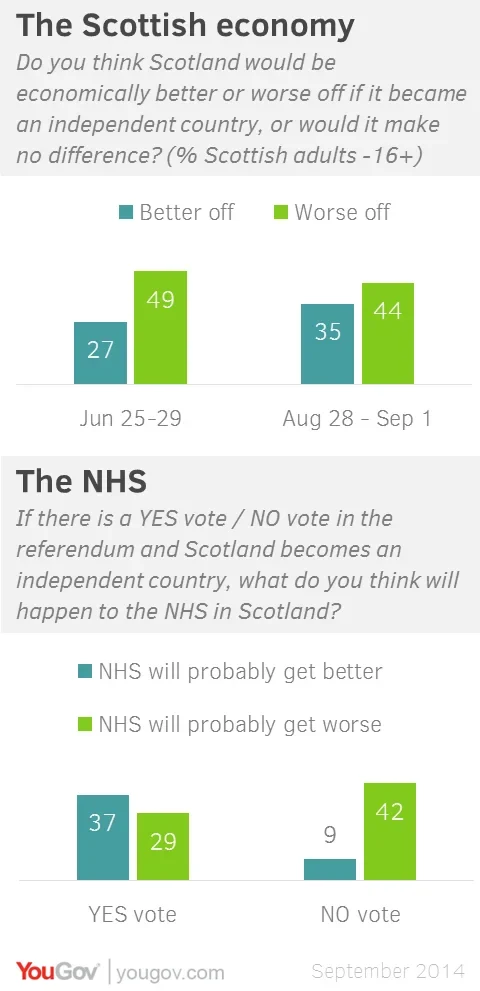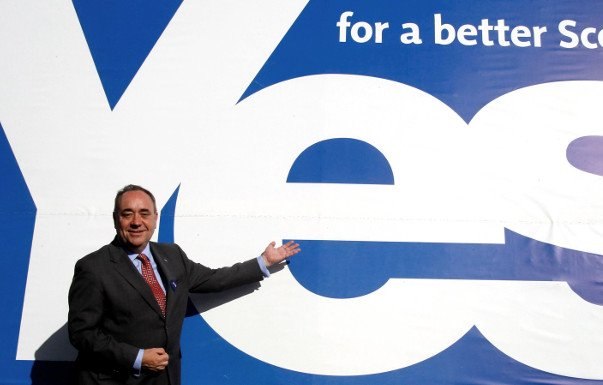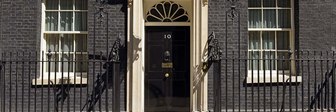In YouGov's latest poll on Scottish independence, the 'no' lead has collapsed to just six points
For six months, Alex Salmond seemed to be heading for a heavy defeat. Successive YouGov polls on Scotland’s coming referendum showed the ‘no’ vote leading ‘yes’ by at least 16 points. Our last poll, in mid-August, reported the narrowest lead yet, but still a substantial 14 points. In the past fortnight, that has collapsed to just six points, with ‘no’ leading ‘yes’ by just 53-47%. A close finish looks likely, and a ‘yes’ victory is now a real possibility.
When I first saw our data, I wanted to make sure the movement was real. All polls, however carefully conducted, are subject to sampling error. Can we be sure the rise in support for independence is real?
I am certain it is. My reason is that of the 1,063 people we questioned, almost 500 are people we had questioned earlier this year in one of our surveys reporting much bigger ‘no’ leads. We can therefore compare what they said then with what they say now. We find that the ‘yes’ campaign has gained 35 supporters and lost just eight. In contrast, the ‘no’ campaign has gained 13 and lost 21. The ‘yes’ campaign has both gained converts, and secured a two-to-one lead among people who were undecided and have now taken sides. The net movement among this before-and-after section of our panel is in line with our overall figures.

What, then, has happened? The biggest movements have been among Labour supporters and the (admittedly far fewer) Liberal Democrats. One month ago, only 18% of people who backed Labour in the last Holyrood elections told us they would vote ‘yes’; that figure is now 30%. The ‘yes’ vote among Lib Dem voters has doubled to 24%. At the same time, the minority of SNP voters intending to vote ‘no’ has shrunk from 29% to 22%. (Tory voters remain solidly ‘no’, by 97-3%, but they comprise only one Scot in ten.)
What explain these shifts? A major factor concerns attitudes to the economy. From time to time we ask people whether they think Scotland would be better or worse off if it became independent. Just nine weeks ago, in late June, pessimists outnumbered optimists by 49-27%. Now the gap is far narrower: 44-35%. Again, the biggest movement has been among Labour supporters.

It’s not just ‘the economy, stupid’. The ‘yes’ campaign is also boosted by widespread fears that if Scotland stays in the UK, the NHS in Scotland would get worse. Only 9% think it would improve. On the other hand, more people think an independent Scotland would ensure the NHS improves (37%) rather than deteriorates (27%).
In other words, Salmond has started to neutralise the fear factor that drove the big no leads until a month ago. Many people still worry about how an independent Scotland would handle issues such as the currency – but now, a great many Scots are also beginning to fear remaining part of the UK.
That said, Salmond has not made progress on every front. When we ask people whether independence would make them personally better or worse off, the figures are virtually unchanged, with pessimists outnumbering optimists by a steady two-to-one.
In personal terms, Salmond has reclaimed his lead over Alistair Darling, the leader of the ‘no’ campaign. We asked respondents whether they trusted ‘the statements and claims’ of the two men. Salmond’s net score of minus 20 (trust 38%, not trust 58%) is not great, but it’s better than Darling’s score of minus 28 (33-61%). Two weeks ago, after their first television debate, Salmond (minus 23) trailed Darling (minus 14).
Over the next 16 days, we shall find out whether the momentum of the past month is sustained, or if the ‘yes’ vote has peaked following the second television debate. But even if ‘no’ finally wins the day, it now looks less likely that it will win by a big enough margin to deliver a knock-out blow to supporters of independence. If the final vote is anything like our current poll figures, I would not bet much against a second referendum being held within the next 10-15 years.
See the full poll results here
Want to receive Peter Kellner's commentaries by email? Subscribe here







